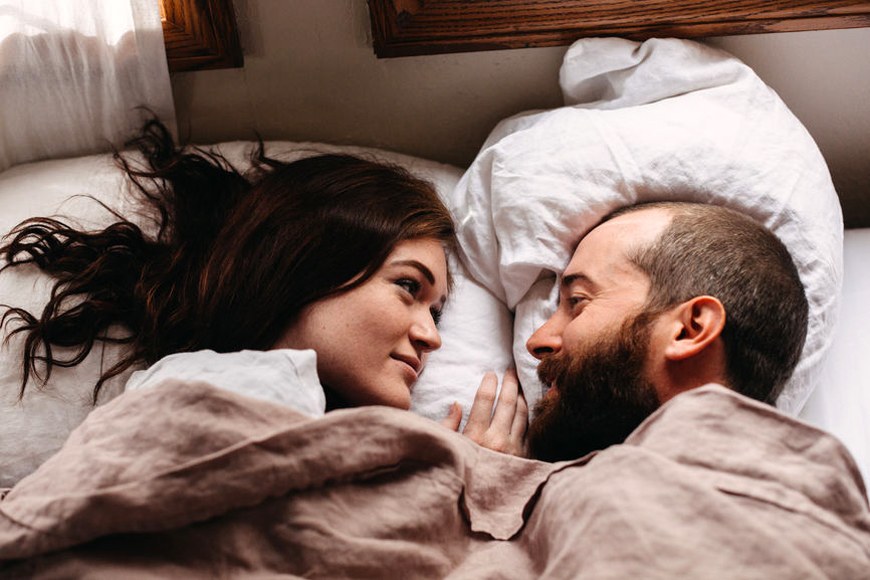5 Major Reasons Why Sleeping Next to Your S.O. Is so Freaking Hard
Falling asleep—and staying asleep—can be a struggle even in the best of circumstances. A fluffy duvet and a California king-sized bed aren't always enough to counteract bedtime anxiety, a crying baby, or neighbors who love to rock out to heavy metal at 2 a.m.
But an extra obstacle to getting that sweet, sweet shut-eye: your significant other. A 2018 survey of 2,000 people who live with their partner found that one in five people say their partner is the biggest reason why they have trouble sleeping. And having a partner snoring in bed was the biggest complaint on the list.
For more insight, I called two of the most respected sleep experts in the industry: Shelby Harris, Psy.D, C.BSM, who is the director of the behavioral sleep medicine program at the Sleep-Wake Disorders Center at Montefiore Medical Center (she's also an assistant professor of neurology and psychiatry at Albert Einstein College of Medicine), and Charlottesville Neurology and Sleep Medicine owner W. Chris Winter, M.D., a sleep researcher, neurologist, and the author of The Sleep Solution.
Regardless of what the issue is, both experts stress that having the exact same sleeping preferences as your partner isn't always in the cards—and that's normal. The key is to approach it with compassion. "You should care about your partner's sleep quality," Dr. Harris says. "If you don't—or they don't care about yours—that's a whole other discussion."

{{post.sponsorText}}
Here, they share some of the biggest sleep problems for couples—and how to deal with them. If you dream of sharing a bed comfortably with your partner all night, keep reading and try putting these tips to good use.

1. Snoring
"There are two ways to approach this," says Dr. Harris. "One is what can the snoring partner do to minimize the snoring, and the other is what can the partner who is being kept up to do deal with the noise."
The first step is for the snoring partner to get checked out by their doctor to rule out any sleep disorders, like sleep apnea (where breathing repeatedly stops and starts during sleep). "If you notice any pauses in their snoring, gasps, or choking, those are all signs," Dr. Harris says. She also says anything that relaxes the muscles or loosens the airway, like alcohol, could lead to snoring, too. (So if your S.O. is really sawing some logs after a night out bar-hopping, you know why.)
Body position also plays a role. Dr. Harris says some people snore when they lay on their back—not on their right or left side. "There are actually special shirts you can buy that prevent you from rolling onto your back," she says. "Or, you can DIY it by taking a shirt with a front pocket, wearing it backwards, and putting a tennis or racquetball in it." Dr. Winter says elevating the upper body can also help—try placing an extra pillow under the upper back.
Want to take matters in your own hands? Earplugs are an obvious option. (Dr. Harris says to go for silicone ones over foam, which work better.) Dr. Winter says white noise machines can help too, particularly ones that are crafted to cancel out noise instead of merely covering it up, like Nightingale.
2. Tossing and turning
Step one for this issue is the same for a partner snoring: Have them get checked out by their doc to rule out more serious sleep probs. "Often, it actually is linked to a sleep disorder, like sleep apnea," Dr. Harris says.
"After that, you have to take into account why the person is tossing and turning," Dr. Winter says. "Is it insomnia and they're moving around because they can't fall asleep? Are they having breathing disturbances? Restless legs or muscle cramps? Is the mattress uncomfortable? These are all questions to ask."
He also says a mattress that dampens movement transference is a great option, if it's in your budget.
3. Different bedtimes
Maybe one person is a night owl while the other is an earlier riser. Or maybe different work schedules have forced different bedtimes. Either way, one person is often up staring at the ceiling while the other person is drifting off to dreamland.
"Shift work has made this very common," Dr. Winter says. "I always ask people to figure out what part of the separate bedtimes is problematic. Is it light from opening the door? Noise being made? The mattress shaking when someone gets into bed?" Once you know, you can start problem solving, whether it's by getting a mattress that isn't as sensitive to movement, a white noise machine, oiling the door hinge so it doesn't creak, or using a sleep mask.
He also says a pretty common solution is for couples to sleep together for part of the week, and separately on other nights. That way, there are at least a few nights a week where both people get uninterrupted sleep. "This idea that individuals are going to be perfectly synchronized is difficult," he says.
Dr. Harris agrees, saying: "Sometimes you just have to accept that you have different body clocks and you do what you can. People have different body clocks and there’s nothing you can really do about it." If it's just a couple hours' difference, her advice is to wind down in the den together, and then heading to bed separately. "I don't love people using the bed for activities other than sleep or sex; the more time you spend teaching your body that the bed is a place to be awake, it can actually worsen insomnia and sleep problems later on," she says.

4. One person likes falling asleep with the TV on
Nearly two-thirds of people like to doze off with the TV on, but both experts say this is one popular habit not worth trying to compromise for. "Even though many people say it makes them feel calm, studies show it can keep you up," Dr. Winter says. "It's easier to train yourself how to fall asleep with the TV off than to train yourself on how to sleep with it on," Dr. Harris adds. "We're meant to sleep in a dark cave."
"If the person who likes falling asleep with the TV on isn't willing to budge, they could at least put it on a timer so it's not just playing endless episodes of Friends all night long," Dr. Winter says. He also recommends watching with Bluetooth headphones so the noise won't wake the other person up. "But really, they need to learn how to sleep with the TV off," he says.
5. One person likes it cold; one person likes it warmer
Disagreeing over the thermostat can also lead to bedtime probs. Dr. Harris says the ideal temperature for sleep is between 65°F to 70°F, so that's a good baseline to start from. If that's too cold for one person, they can cope with warmer PJs or an extra blanket. "Some couples use comforters of two different weights, one for one side, and one for the other," she says. "That can make a big difference, too."
If none of this seems to be working for you... "I actually recommend to some couples that they sleep in separate bedrooms," Dr. Harris says. "You get in bed at the same time, be intimate for a little while and cuddle, but then when it's actually time to go to sleep, you do it in different rooms. It actually reduces the pressure that you put on each other and gets rid of the resentment that can happen. Sleeping separately can be really freeing for a lot of people."
Here's what Elle Macpherson does to make sure she wakes up well-rested. And what you need to know about incorporating magnesium into your sleep routine.
Loading More Posts...